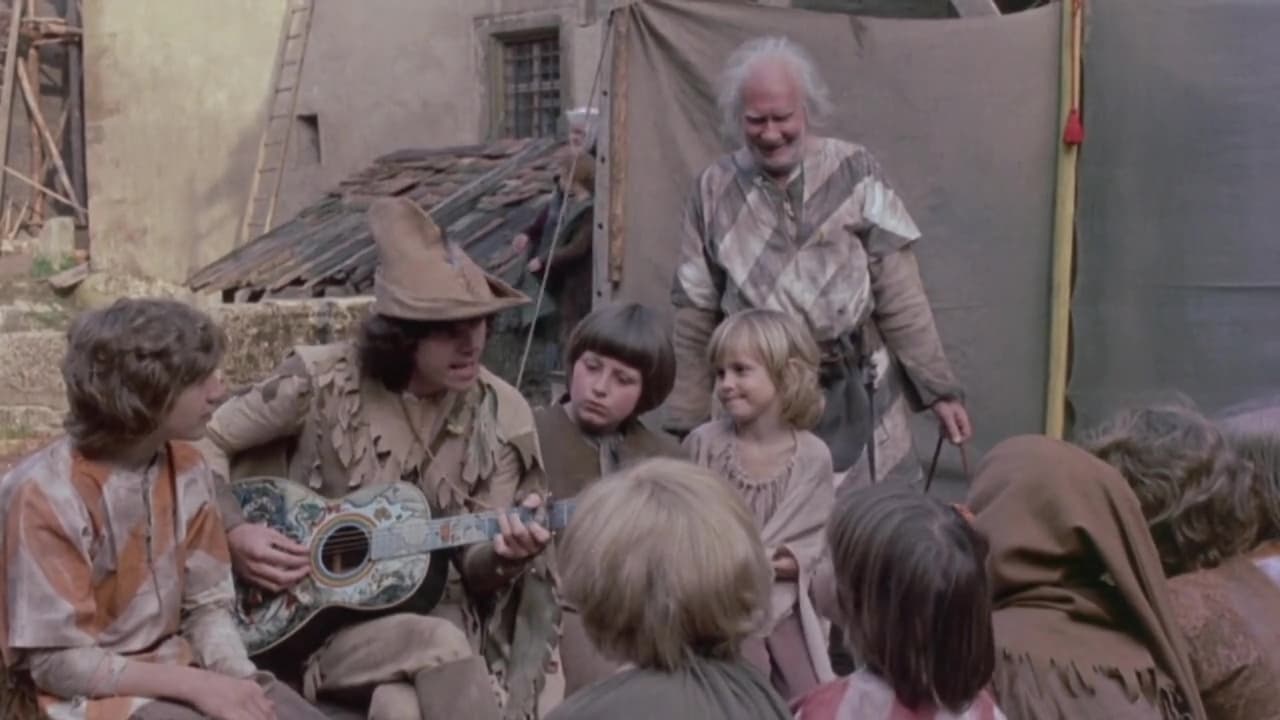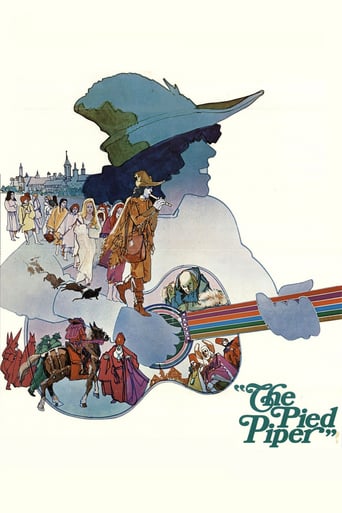

It's not the free-spirited musical one would expect given that Donovan, the high priest of pop psychedelia, has the title role. Nor is it anything approaching a children's film. This is a grim, unrelentingly downbeat telling of the classic tale of a piper who rids a German burgh of black plague-infested rats...at least in part...as the piper is off screen for most of the film. Instead, director Jacques Demy focuses on the politics of Hamelin and the infighting between town officials Roy Kinnear, John Hurt, Donald Pleasence and others. Hurt, as a sleazy royal, marries an 11 year old girl, much to the chagrin of Jack Wild (as a lame artist). There's even a burning at the stake! Despite the identity crisis the film suffers from, it's still fairly intriguing, capturing depressing village life of 1349. Donovan sings a few songs and does indeed lead the rats out of the village (among other things) and the acting is all great, particularly by Hurt. A very blowzy Diana Dors plays Kinnear's wife (one shutters thinking about THAT courtship).
... View MoreWhen I began watching "The Pied Piper" I assumed it would be a children's movie. After all, it starred pop singing star, Donovan, and is a tale traditionally told to kids. However, soon after it began I could tell this was no child's tale! Instead of the version I heard, this one is set during the time of the Black Death in the mid-1300s and is a tale about superstition, hypocrisy, wretchedness and greed. The version I'd heard as a child was more just a story about greed.Hamelin, Germany is a town possessing three sorts of people--smart people (and I counted only three--Gavin, the Alchemist and the Piper), greedy turds (all the church people and leaders of the town) and assorted victims just waiting to get it! When the Plague nears, the smart Alchemist somehow knows the rats carry the disease (how he knows, we are never sure) and warns the town that they must rid themselves of the rats. At first, no one takes him seriously but when the rat population explodes, the folks in town become revolting (insert own joke) and the town's officials are forced to do something other than scrounge for money or conscripts in some god-awful war for the Papacy.You probably are familiar with the rest of the tale, but if you aren't, the Piper agrees to remove the rats IF they pay him a thousand gilders. They readily agree, but after the miraculous feat occurs, they stiff him--saying they'll give him fifty and he should be happy to have that! Nice, huh?! So, to teach them a lesson (or perhaps he's a pedo), he plays his pipe again and the kids of town all follow him and disappear forever. The towns folk don't realize what's happening, as they're too busy burning the Alchemist alive for 'causing the Plague'! Only the handicapped kid, Gavin, is spared, as he walks too slow to keep up with the Piper. Whether this is a good thing or not is a bit vague--after all, what would a grown man want to do with all those kids?!? The film is well-made but also a really creepy movie from start to finish. It is more a story about stupidity and karmic retribution--not bad topics, really, but far from a fun film for the entire family! The costumes and sets were very nice but the whole film is a creepy downer (though I must admit the depiction of Plague was VERY sanitized). I know it's not in the traditional tale, but I wanted to have some reassurance the Piper was not a serial killer, pedophile or owner of a dog food company!!! By the way, in one scene Donovan plays a modern six-string guitar--something not invented until very recently. The original four and five-stringed varieties were not even invented until 100-200 years after the film was set.
... View MoreI had seen this one ages ago on local TV, back in the early 1980s when our set was still in black-and-white! Naturally, I welcomed Paramount’s idea to let Legend Films release it on DVD albeit bare-bones, and I luckily happened upon it in (arguably) Malta’s best-stocked DVD rental store when it comes to vintage Hollywood movies.I’ve been a fan of Fairy Tales every since early childhood when illustrated Maltese translations of the Brothers Grimm’s famous stories where constant companions during the Summer holidays and, when my main interest migrated to film, I eagerly sought out examples of this type. The French seemed to do the genre particularly well – Ladislaw Starewicz’s delightful pioneering puppet classic THE TALE OF THE FOX (1931), Jean Cocteau’s enchanting LA BELLE ET LA BETE (1946) and the charming animated fable LE ROI ET L’OISEAU (1979). Jacques Demy also tried his hand at this by bringing DONKEY SKIN (1970) to the screen with Catherine Deneuve, Jacques Perrin, Jean Marais and Delphine Seyrig. In fact, THE PIED PIPER was his next project and follows similar lines – even if it’s a British production shot in Germany, though still with an equally remarkable cast: Jack Wild, Donald Pleasence, John Hurt, Michael Hordern, Peter Vaughan, Roy Kinnear, Diana Dors and, in the titular role, folk singer Donovan! The general consensus about Demy is that his career peaked early (late 1960s) and progressed engagingly but unremarkably towards an untimely end (early 1990s); actually, I haven’t seen any of his acknowledged masterpieces yet – I do own THE UMBRELLAS OF CHERBOURG (1964) on R2 DVD, though, and also have the ultra-rare LADY Oscar (1979) in my unwatched pile.While Maltin gives this version of THE PIED PIPER (incidentally, the 1957 TV-film with Van Johnson and Claude Rains is also available for rental over here) a very generous , most other reviews of the film I’ve come across were usually mixed and less enthusiastic. In fact, I’d say that its unexpectedly grim tone got to be a bit much at times and left one with a sour taste in the mouth; besides, in spite of Demy’s detached approach (with very few close-ups throughout), the whole still felt somewhat claustrophobic. Even so, the actors, the décor, the costumes and the music eventually save the day: Wild has probably his most significant role after OLIVER! (1968) as Jewish alchemist Hordern’s lame assistant; Pleasence and Hurt are truly despicable as greedy father and son and the town’s chief citizens; Kinnear and Dors as the burgomaster and his wife who want to marry off their teenage offspring (Cathy Harrison, Rex’s daughter) to Hurt; Peter Vaughan is a bloodthirsty Bishop who eventually has Hordern burned alive at the stake.The troupe of traveling players in a plague-ridden medieval town cannot help but raise comparisons with Ingmar Bergman’s THE SEVENTH SEAL (1957), while the onslaught of the rats (at one point coming out of the wedding cake!) might well have influenced a similar scene in Werner Herzog’s NOSFERATU THE VAMPYRE (1979). Finally, Donavan’s score is pleasant if not quite memorable – his performance is equally decent even if, the film’s title notwithstanding, he is not really the main character!
... View MoreDonovan sings three songs :outside the wonderful "sailing homeward",he performs two ditties "I'm the pied piper" (obvious) and "life has her (!) ups and her downs".It was filmed on location in Germany"The pied piper" ,like "Peau d'âne" which was released the year before, is a fairy tale ,but the mood is drastically different:I would say that "peau d'âne" is a movie for children that can appeal to adults,and "the pied piper" a movie for grown -ups which can appeal to children."Peau d'âne" is the bright Renaissance,with its châteaux de la Loire such as Chambord,and the forest and the country are not hostile,it's a providential world."The pied piper" is the dark Middle Ages;the beginning might have been influenced by Bergman's "the seventh seal":the wandering entertainers ,the plague ,the "sorcerer" ...The screen play is almost an original one:the famous legend lasts barely ten minutes ,the rest of the plot is completely new and extremely pertinent.Two worlds clash in Demy's work: the world of Melius the jew,that of an embryonic science and a desire to explain the things and to react to them:he comes much too soon and anyway the Jews suffered persecutions in those troubled times too:think that Louis IX,King of France of the thirteenth century ,forced the jews to wear the "rouelle",a sinister ancestor of Hitler's yellow star.And he became Saint-Louis, canonized by the Catholic Church.And there's the world of the bishops,sinister characters dressed in red,red as blood,who personify intolerance and ignorance :unlike Melius,they react to the bubonic plague by saying it's a God-sent ordeal,because men are sinners,they do not have to understand but they must be ready to repent and to mortify (self-flagellation).The wedding is revealing as well:listen to the bishop,the way he speaks to the bride:she is an impure human being,whose only way is to follow her husband's rule:till 1215,woman had no soul!Demy expresses his disgust with the famous scene of the wedding cake: big rats appear,they had entered the cathedral-pastry.It won't be long before the magnificent dessert crumble .And it will not be long before Hamelin itself and its hypocrite priests crumble like Sodom .So the pied piper is like God's angel ,leading Lot out of this doomed place.The children are the just men,sometimes sacrified as Hurt's unfortunate bride ,a child herself -a girl used to get married at an early age in those ancient times.Demy 's pessimism,which passed for melancholy in "Lola" , muted in "les parapluies de Cherbourg",seemed to disappear in "les demoiselles de Rochefort" and "peau d'âne", is glaring in "the pied piper".This is probably his darkest work.Thus ,one can forget his return to the ponderous comedy with Deneuve and Mastroianni in 1972"."The pied piper" remains an overlooked,ignored work.How many Demy's fans do not even know that this film exists?I urge them to see it,it's an essential part of his work,and maybe his swansong,because he was never to reach such heights afterward.
... View More